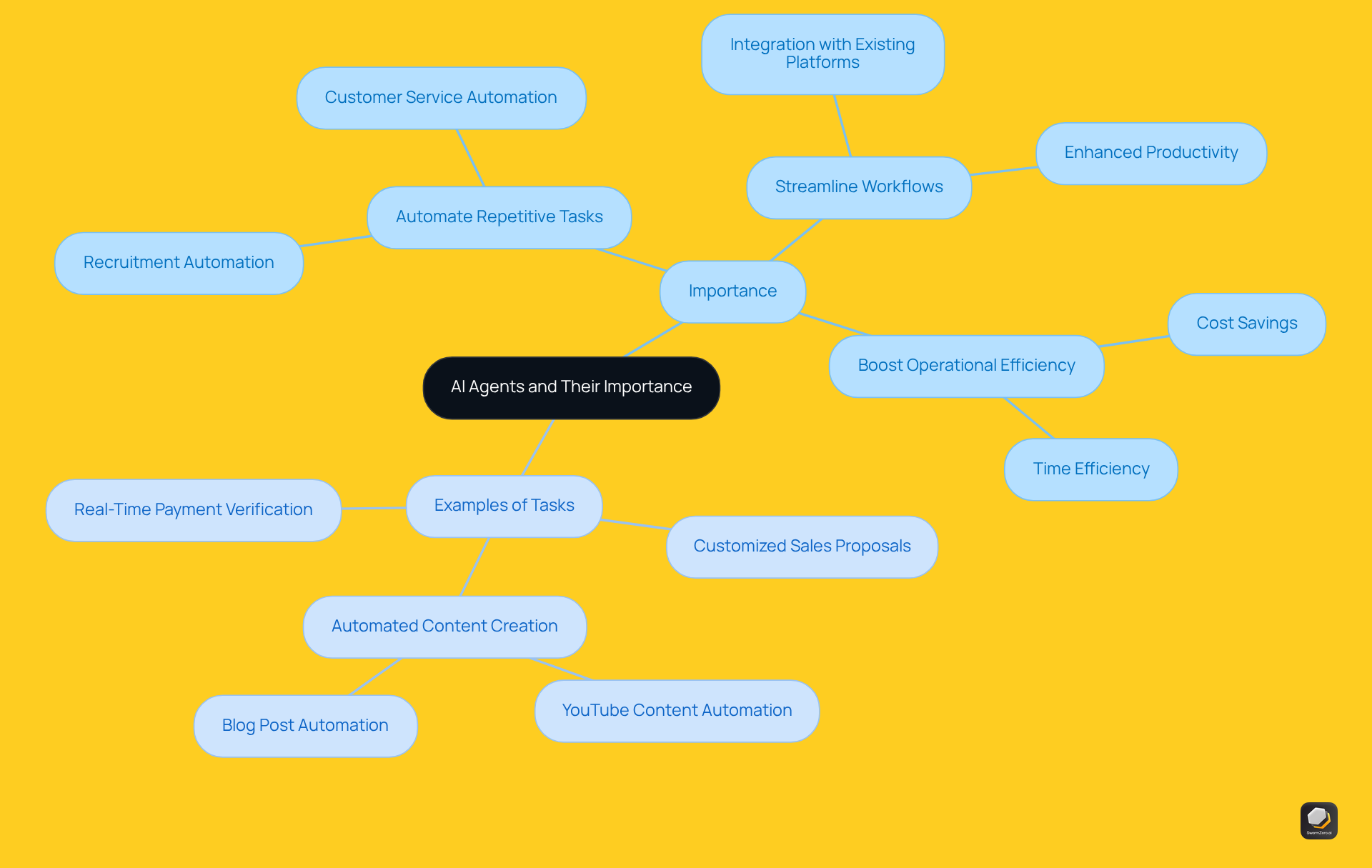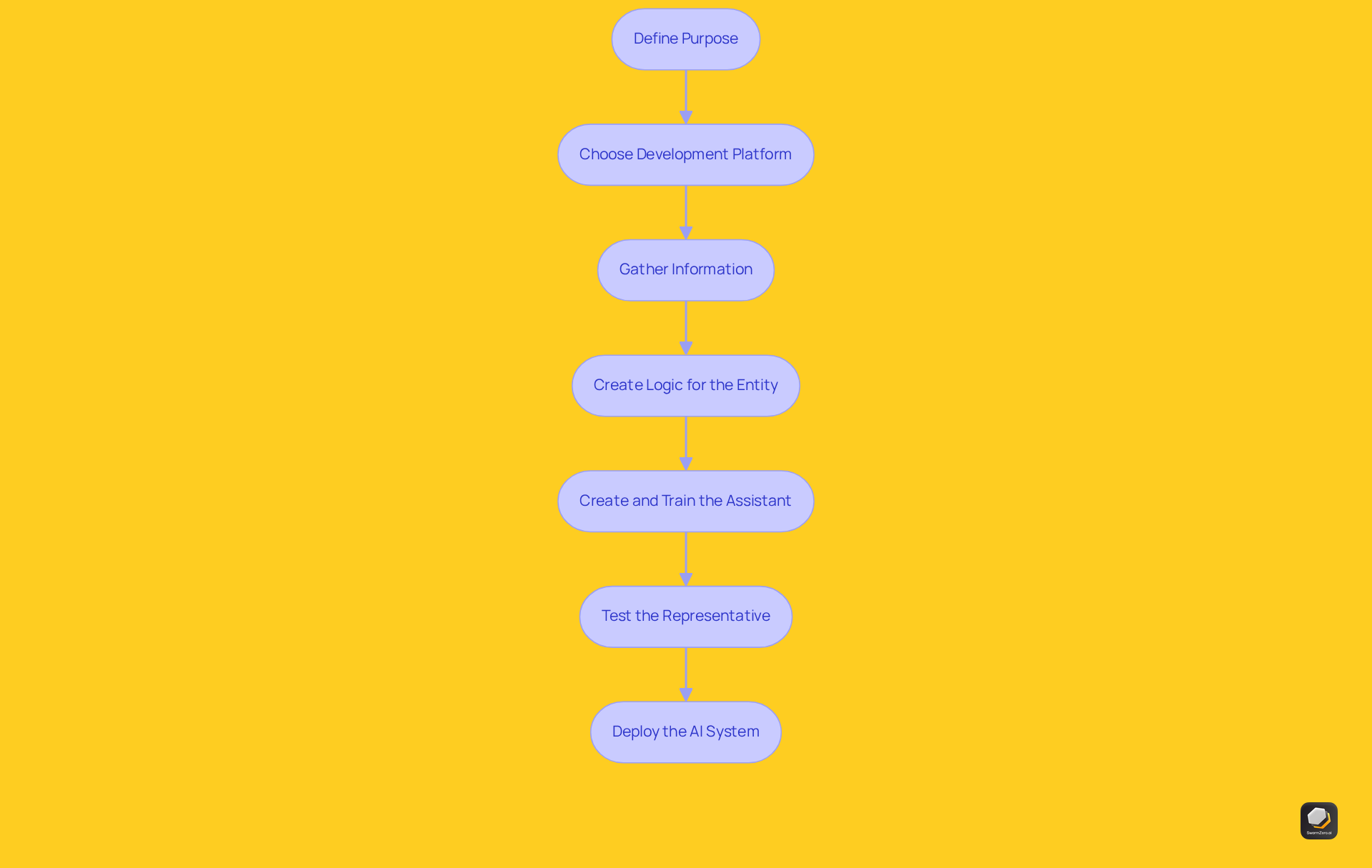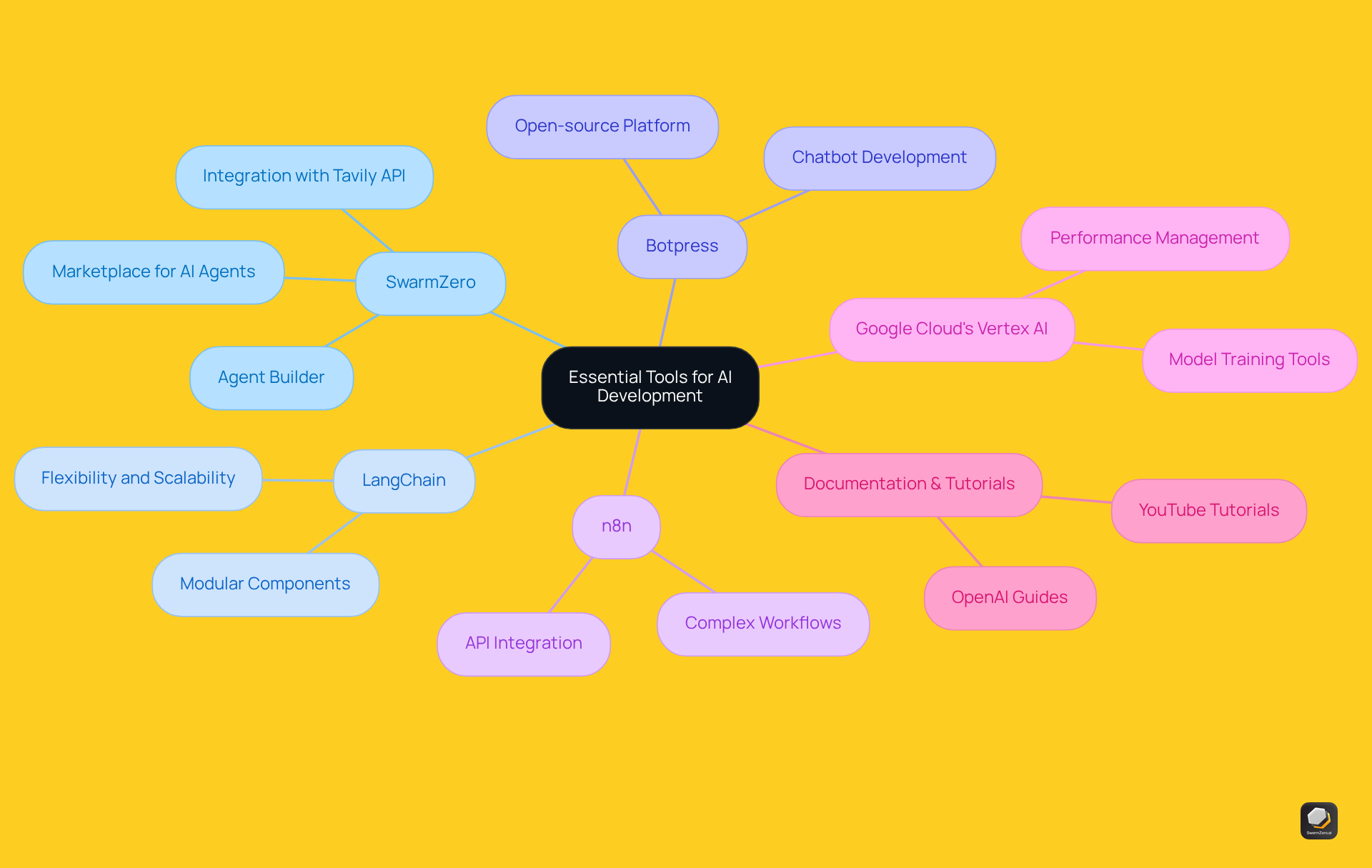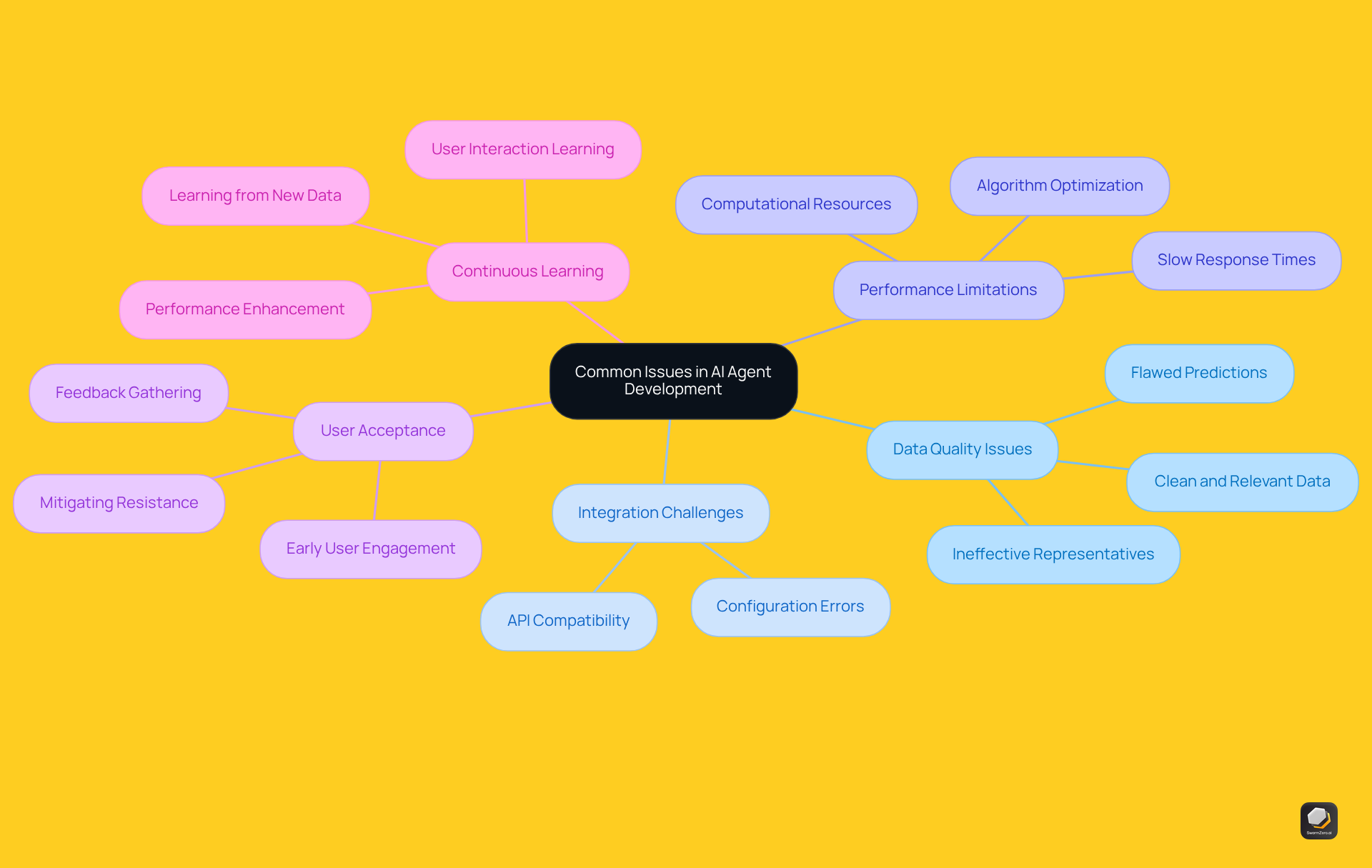How to Build Your Own AI Agent: A Step-by-Step Guide
Learn how to build your own AI agent with this comprehensive step-by-step guide.

Key Highlights:
- AI agents are advanced software applications that autonomously perform tasks, enhancing operational efficiency and automating repetitive processes.
- Integrating AI systems can lead to cost savings, improved accuracy, and better resource allocation in organisations.
- Examples of AI applications include generating sales proposals, automating content creation, and real-time payment verification.
- The SwarmZero framework offers a marketplace for creating and automating AI solutions, enhancing web search capabilities through the Tavily API.
- Over 70% of companies plan to adopt AI technologies by 2025, indicating a growing trend in operational optimization.
- The process for building an AI agent includes defining its purpose, choosing a development platform, gathering information, creating logic, training the assistant, testing, and deploying the system.
- Essential tools for AI development include SwarmZero, LangChain, Botpress, n8n, and Google Cloud's Vertex AI.
- Common issues in AI agent development include data quality, integration challenges, performance limitations, user acceptance, and the need for continuous learning.
Introduction
Creating an AI agent may appear daunting, yet the transformative potential of these autonomous systems is reshaping the landscape of modern business. Organisations are increasingly recognising the value of AI in automating tasks and enhancing productivity. Therefore, understanding how to build an effective AI agent is essential. What are the key steps and tools necessary to navigate this complex development process? Additionally, how can developers overcome common challenges along the way?
Define AI Agents and Their Importance
AI systems represent advanced software applications that autonomously execute tasks for users or systems. They leverage artificial intelligence to analyse data, make informed decisions, and act without human intervention. Their importance is highlighted by the capacity to automate repetitive tasks, streamline workflows, and significantly boost operational efficiency.
By integrating AI systems into business processes, organisations can achieve substantial cost savings, improve accuracy, and reallocate human resources to more strategic initiatives. For example, AI systems can:
- Generate customised sales proposals
- Automate content creation for platforms like YouTube
- Ensure real-time payment verification
Each contributing to a marked increase in productivity.
Moreover, the SwarmZero framework offers a comprehensive AI solution marketplace, enabling businesses to efficiently create, profit from, and automate solutions. By utilising the Tavily API, SwarmZero enhances web search capabilities through AI-powered processing, establishing itself as an invaluable tool for organisations aiming to optimise their operations.
As we approach 2025, the adoption of AI systems is projected to rise, with over 70% of companies planning to implement AI technologies. This trend underscores the growing importance of AI in optimising operations across various sectors.

Follow a Step-by-Step Process to Build Your AI Agent
-
Define the purpose by identifying how to build own AI agent for the specific tasks your AI system will undertake. This could range from automating customer support to generating personalised sales proposals, significantly enhancing operational efficiency.
-
Choose a Development Platform: Select a platform that aligns with your requirements. SwarmZero stands out with its intuitive Agent Builder, enabling straightforward customization of AI entities. Other frameworks like LangChain and Botpress are also popular choices as of 2025.
-
Gather Information: Collect and prepare the necessary information for your representative to function effectively. This involves cleaning and organising datasets pertinent to the tasks, ensuring access to high-quality information.
-
Create the Logic for the Entity: Outline the decision-making processes and actions your entity will execute based on the data it receives. This step is crucial for ensuring that the representative can respond appropriately to various scenarios when considering how to build own AI agent.
-
Create and Train the Assistant: Utilise your selected platform to construct the assistant, incorporating machine learning models as necessary. Train the representative with the prepared data on how to build own AI agent to ensure effective learning, enhancing its ability to make informed decisions.
-
Test the Representative: Conduct comprehensive testing to identify any issues or areas for improvement. This may involve running simulations or pilot programmes to ensure the representative performs as anticipated in real-world scenarios.
-
Deploy the AI System: After successful testing, place your AI system into the desired environment. Ensure it integrates seamlessly with existing systems, allowing for smooth operation and maximising its impact on productivity.

Identify Essential Tools and Resources for Development
To build your AI agent effectively, consider leveraging the following essential tools and resources:
- SwarmZero: This innovative platform features an intuitive Agent Builder that simplifies the creation and deployment of AI agents. The Agent Creator enables users to customise assistants to specific requirements, automate diverse tasks, and seamlessly incorporate the Tavily API for improved web search functionalities. It establishes itself as a comprehensive marketplace for developing, monetizing, and automating business solutions.
- LangChain: A widely adopted framework for building applications with large language models, LangChain offers modular components that provide flexibility and scalability in AI development.
- Botpress: An open-source platform designed for developing AI systems, Botpress excels in creating chatbots and conversational interfaces, making it a popular choice among developers.
- n8n: This versatile automation tool facilitates the integration of various APIs and services, making it ideal for constructing complex workflows that enhance AI system functionality.
- Google Cloud's Vertex AI: A robust infrastructure for deploying AI systems, Vertex AI provides comprehensive tools for training and managing models, ensuring optimal performance.
- Documentation and Tutorials: Utilise online resources, including guides from OpenAI and tutorials available on platforms like YouTube, to deepen your understanding and enhance your skills in AI development.
By utilising these tools, developers can learn how to build their own AI agent to create effective AI systems that streamline operations and enhance productivity across various applications.

Troubleshoot Common Issues in AI Agent Development
When developing AI agents, several common issues may arise:
- Data Quality Issues: It is crucial to ensure that the data used for training is clean and relevant. Poor data quality can lead to flawed predictions and ineffective representatives.
- Integration Challenges: If your representative encounters difficulties connecting with existing systems, verify API compatibility and check for any configuration errors.
- Performance Limitations: Should the representative be slow or unresponsive, consider optimizing the underlying algorithms or increasing computational resources.
- User Acceptance: Engaging with end-users early in the development process is essential for gathering feedback and ensuring the system meets their needs. This proactive approach can help mitigate resistance to adoption.
- Continuous Learning: Implement mechanisms that enable your agent to learn from new data and user interactions, which is essential for understanding how to build your own AI agent and enhancing its performance over time.

Conclusion
Building an AI agent is a transformative process that empowers businesses to enhance efficiency and automate various tasks. Understanding the significance of AI agents and following a structured approach enables individuals and organisations to harness the power of artificial intelligence, optimising operations and driving productivity.
This article provides a comprehensive step-by-step guide for creating AI agents, starting with defining their purpose and selecting the right development platform. Key tools and resources, such as SwarmZero, LangChain, and Botpress, are essential for effective development. Furthermore, common challenges in AI agent creation, including data quality and user acceptance, are addressed, offering valuable insights for developers.
Ultimately, the journey of building your own AI agent not only streamlines workflows but also opens the door to innovation across various sectors. Embracing this technology is crucial, as it prepares organisations for the future landscape of business where AI will play an increasingly vital role. Engaging with these tools and processes today can lead to significant advantages, making it imperative for businesses to invest in AI development and stay ahead in a rapidly evolving digital world.
Frequently Asked Questions
What are AI agents?
AI agents are advanced software applications that autonomously execute tasks for users or systems by leveraging artificial intelligence to analyse data, make informed decisions, and act without human intervention.
Why are AI agents important?
AI agents are important because they can automate repetitive tasks, streamline workflows, and significantly boost operational efficiency, leading to substantial cost savings and improved accuracy for organisations.
What are some examples of tasks that AI systems can perform?
AI systems can generate customised sales proposals, automate content creation for platforms like YouTube, and ensure real-time payment verification, all contributing to increased productivity.
What is the SwarmZero framework?
The SwarmZero framework is a comprehensive AI solution marketplace that enables businesses to efficiently create, profit from, and automate AI solutions.
How does the Tavily API enhance AI capabilities?
The Tavily API enhances web search capabilities through AI-powered processing, making it an invaluable tool for organisations aiming to optimise their operations.
What is the projected trend for AI adoption by 2025?
By 2025, it is projected that over 70% of companies plan to implement AI technologies, highlighting the growing importance of AI in optimising operations across various sectors.
List of Sources
- Define AI Agents and Their Importance
- AI Agents in 2025: The Automation Revolution in Business (https://blackthornsdesign.com/en/blog/intelligence-artificielle/ai-agents-will-be-the-next-big-trend)
- AI Agents in 2025: Expectations vs. Reality | IBM (https://ibm.com/think/insights/ai-agents-2025-expectations-vs-reality)
- AI Agents (https://bcg.com/capabilities/artificial-intelligence/ai-agents)
- Will 2025 Be the Year of the AI Agents? (https://internationalbanker.com/technology/will-2025-be-the-year-of-the-ai-agents)
- None (https://forbes.com/councils/forbestechcouncil/2025/03/07/ai-agents-in-2025-transforming-business-redefining-leadership-and-accelerating-digital-transformation)
- Follow a Step-by-Step Process to Build Your AI Agent
- AI Agents Statistics: Usage And Market Insights (https://litslink.com/blog/ai-agent-statistics)
- 80+ AI Agent Usage Stats for 2025 | Zebracat (https://zebracat.ai/post/ai-agent-usage-statistics)
- Top 30 Agentic AI Facts & Statistics [2025] (https://digitaldefynd.com/IQ/agentic-ai-statistics)
- Top AI Agents Statistics for 2025 (https://salesforce.com/news/stories/ai-agents-statistics)
- Microsoft Build 2025 Book of News (https://news.microsoft.com/build-2025-book-of-news)
- Identify Essential Tools and Resources for Development
- Case Studies - PRIMO.ai (https://primo.ai/index.php/Case_Studies)
- 28 Best Quotes About Artificial Intelligence | Bernard Marr (https://bernardmarr.com/28-best-quotes-about-artificial-intelligence)
- Odyssey AI Partners (https://odysseypartners.ai/case_studies.html)
- Case Studies News and Resources (https://supplychain247.com/topic/category/case_studies)
- Quote Specialist AI Agents - Relevance AI (https://relevanceai.com/agent-templates-roles/quote-specialist-ai-agents-1)
- Troubleshoot Common Issues in AI Agent Development
- (PDF) Artificial Intelligence, Machine Learning and Reasoning in Health Informatics—Case Studies (https://researchgate.net/publication/346113079_Artificial_Intelligence_Machine_Learning_and_Reasoning_in_Health_Informatics-Case_Studies)
- Top takeaways, quotes, and highlights from ScaleUp:AI 2024 (https://insightpartners.com/ideas/top-takeaways-quotes-and-highlights-from-scaleupai-2024)
- Accelerating Drug Discovery – Featuring OMass Therapeutics - YellowDog (https://yellowdog.ai/case_studies/accelerating-drug-discovery-omass-therapeutics)
- 10 Quotes on AI Agents from the Top Industry Experts - Skim AI (https://skimai.com/10-quotes-on-ai-agents-from-the-top-industry-experts)
- 35 AI Quotes to Inspire You (https://salesforce.com/ca/artificial-intelligence/ai-quotes)




